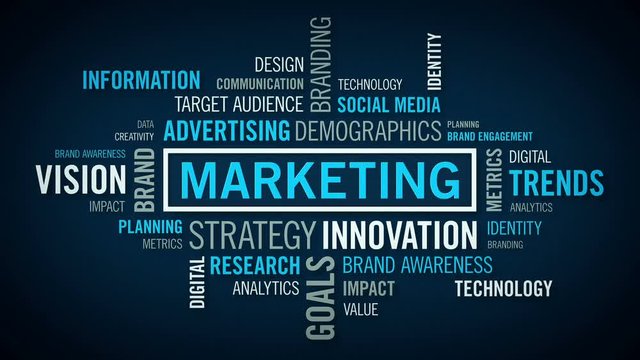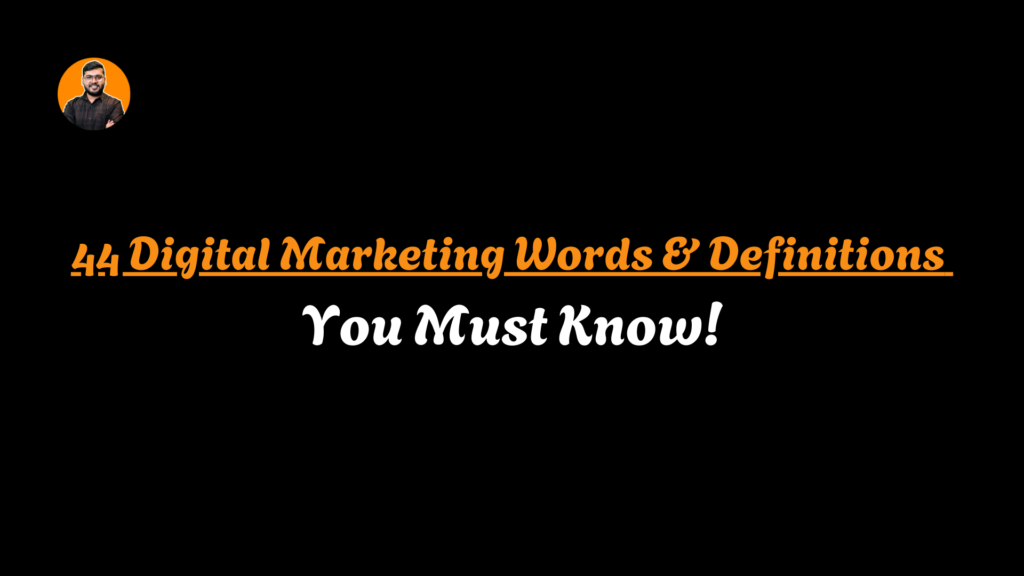Introduction
Digital marketing is an ever-developing industry, and keeping with the latest conditions is necessary for oppressive, business owners and anyone interested in online marketing. Whether you are an early or experienced market, understanding digital marketing words will help you to communicate effectively, optimize strategies, and be ahead of industry trends.
In this blog, we provide a comprehensive list of 44 essential digital marketing words and definitions, which cover everything from SEO and social media to content marketing and PPC.

Table of Contents
Why is it important to understand digital marketing words
- Helps effective communication with customers, teams and stakeholders.
- Understanding marketing reports and analytics improves decision-making.
- Increases learning and updates you with industry trends.
- Boosts confidence when discussing digital marketing strategies.
44 Digital Marketing Words & Definitions
A to E
1. A/B test:- A method of comparing two versions of a webpage or AD to determine which one performs better.
2. Advertisement Click:- Through Rate (CTR)-The percentage of users who click on the advertisement after seeing it.
3. Affiliate marketing:- A display-based marketing model where commissions earn a commission to promote collaborative products.
4. Algorithm: – a set of rules used by the search engine to rank web pages.
5. Anchor Text: – Clickable Text in Hyperlink.
6. Backlink: – A link from another website that indicates you, are required for SEO.
7. Bounce rate:- a percentage of visitors who leave a website without any action.
8. Call-to-Action (CTA):-A quick encouragement to the user to take a specific action, such as “buy now.”
9. Click-Through Rate (CTR)-Click ratio for impressions in an advertising campaign.
10. Material Marketing – A strategy focused on creating and distributing valuable materials.
11. Conversion Rate – Percentage of visitors that complete a desired action.
12. Customer Acquisition Cost (CAC) – Costs associated with receiving a new customer.
13. Domain Authority (DA) – A score that predicts the ability of the website to rank in the search engine.
14. Email Marketing – Sending emails to potential or existing customers for publicity and engagement.
F to J
15. Facebook Pixel: – A tracking code that helps measure advertising performance on Facebook.
16. Funnel:- A marketing model that describes customer travel stages, from awareness to conversion.
17. Google Advertisement: – Google’s advertising platform for paid search, performance and video advertisements.
18. Google Analytics: – A tool that provides insight into website traffic and user behavior.
19. Growth hacking:-one data-operated marketing strategy focuses on rapid development.
20. Hashtag: – A keyword or phrase is used before “#” used on social media for classification.
21. Print: – An advertisement or the number of materials is displayed.
22. Impressive marketing: – collaborating with the affected to promote a brand or product.
23. Internal linking: – connecting one page of a website to another page on the same site.
K to O
24. Keyword Research: – Finding the relevant search term that the user records in the search engine.
25. Landing page: – A standalone page designed for a specific marketing campaign.
26. Lead Generation:– The process of attracting and converting possibilities in customers.
27. Marketing Automation:- Using software to automate repetitive marketing functions.
28. Meta Description:- A brief summary of a webpage displayed in the search results.
29. Organic Traffic:- Website visitors who reach through unpaid search results.
30. Outbound Marketing:- Traditional Marketing methods such as TV advertising and cold calling.
P to T
31. Payment Search: – Advertisement seen in search engine results.
32. Pay-Per-Click (PPC):-An online advertising model where advertisers pay per click.
33. Quality Score: – Google advertisement keywords and ratings of quality and relevance of advertisements.
34. Retiring:- A strategy that targets users who have first visited a website.
35. ROI (return on investment):- a measure of the profitability of a marketing campaign.
36. SEO (search engine optimization):- The process of customizing a website to rank high in search results.
37. SERP (Search Engine Result Page):- The page is displayed after the user enters a search query.
38. Social evidence:- There is evidence that other people are associated with a brand, such as reviews and admirers.
U to Z
39. User Experience (UX): – A user has a holistic experience on a website.
40. Viral Marketing:- A marketing strategy that depends on users sharing faster material.
41. Consultation of content for voice search optimization-Voice-Activated search query.
42. Webinar: – A seminar held on the Internet.
43. XML sitemap:- a file that lists all pages of a website for search engine sequence.
44. Zero moment truth (ZMOT):- The moment a consumer researches a product before purchasing.
Frequently Asked Questions (FAQs)
1. What are digital marketing words?
Digital marketing words refer to industry-specific terms and jargon used in online marketing, such as SEO, PPC, and conversion rate.
2. Why is it important to know digital marketing words?
Understanding these words helps in better communication, campaign optimization, and staying updated with industry trends.
3. How can I learn more about digital marketing terms?
You can follow industry blogs, take digital marketing courses, and apply these terms in real-world scenarios.
4. Are these digital marketing words used in SEO?
Yes, many of these terms, such as keywords, backlinks, and meta descriptions, are essential for SEO.
5. How often should I update my knowledge of digital marketing words?
Since digital marketing evolves constantly, it’s good to update your knowledge at least every six months.
Conclusion
Mastering digital marketing words is essential for marketers, business owners, and professionals looking to succeed online. Whether you’re focusing on SEO, PPC, or content marketing, knowing these terms will improve your strategies and performance.
Stay ahead in the digital world by continually learning and applying these concepts. If you have any questions or want to add more terms, let us know in the comments!


